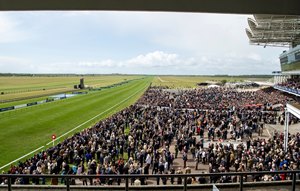Return to Racing in Britain: What We Know So Far


There has been no racing in Britain since the behind-closed-doors meetings at Taunton and Wetherby March 17, as the British Horseracing Authority called a halt to protect essential emergency services and the health and welfare of staff working in the industry.
Irish racing, meanwhile, continued behind closed doors until March 24, when the government announced an end to all sporting events.
Neither country has set a date to resume racing, but hopes are rising that action could begin again next month. In France, the sport is due to resume May 11, and Germany hopes to restart May 4.
When Could Racing Resume?
No decision on when racing can begin again in Britain will be made until after the government's next review of its lockdown measures, due May 7. Spectators will not be allowed in before June at the earliest, and jump racing has been ruled out until July 1.
The return of sport relies on government restrictions being eased, which in turn depends on five tests: making sure the National Health Service can cope; a "sustained and consistent" fall in the daily death rate; the rate of infection decreasing to "manageable levels," ensuring the supply of tests and personal protective equipment can meet future demand; and being confident any changes would not risk a second peak.
The BHA has stressed that its planning means racing will be able to resume as soon as possible after it is given the go-ahead by the government.
And the odds on racing returning next month have shortened to 2-5 with bookmakers following reports that the government could allow the Premier League and other sports to return within weeks.
A lockdown is in force in Ireland until May 4, after which it is expected that some of the current restrictions on society and economic activity may be gradually eased.
Horse Racing Ireland has not committed itself to any resumption date but is also acting to ensure it is ready to relaunch the sport once allowed to do so.
What Will a Resumption Look Like?
A phased return could begin with racing behind closed doors at a handful of venues selected for their ability to comply with tight quarantine restrictions, possibly using hub courses such as Newmarket, Lingfield, and Newcastle where those needed to run a fixture—jockeys, stable staff, and officials—could stay close by or on-site in hotels.
Prize money will be reduced. With no paying crowds, and betting shops likely to be shut, course revenues will be significantly hit, and the Levy Board will have to meet many of the costs of racing, which will also cut the number of fixtures that can be staged.
No course has been ruled out of taking part in a resumption in Ireland, which has plans for a month of flat racing once given the all-clear.
IHRB communications director Niall Cronin said: "I don't think there will be any tracks that will cause a problem, given a bit of imagination and, of course, given that bit more time to prepare."
But the government's announcement that gatherings of 5,000 or more people are to be banned until Sept. 1 means that events such as the Galway Festival, which normally draws a huge crowd, will be staged behind closed doors.
With betting shops shut, Irish racing is resigned to a massive shortfall in media rights income.
What Restrictions Will Be in Place?
The key is to minimize the potential for injury and reduce any pressure on the NHS, so field sizes in Britain will initially be capped at 12 runners a race, which also will help with social distancing.
In the early stages, only the more senior jockeys will be able to ride, and nobody will be allowed to attend more than one meeting a day, so as to reduce the risk of transmitting the virus.
But no such restrictions on riders are planned in Ireland.
What Will This Mean for the Big-Race Program?
If racing resumes in time, Royal Ascot will go ahead behind closed doors at its scheduled date, beginning June 16.
Britain's first four classics have already been postponed, with the QIPCO One Thousand Guineas (G1) and QIPCO Two Thousand Guineas (G1) penciled in for June, and the Investec Derby (G1) and Investec Oaks (G1) potentially run on the same day, but at their usual venue of Epsom, in July.
It is unlikely the entire black-type schedule will be staged, with priority given to the classics and other key races "aimed at horses most likely to provide a future fundamental role on behalf of the breed."
Britain's first group 1, the Lockinge Stakes at Newbury, is unlikely to go ahead as planned in May.
